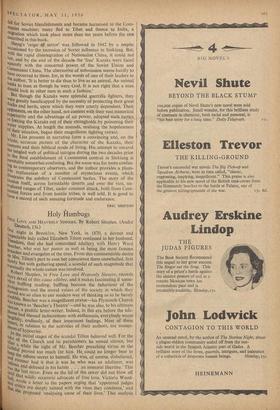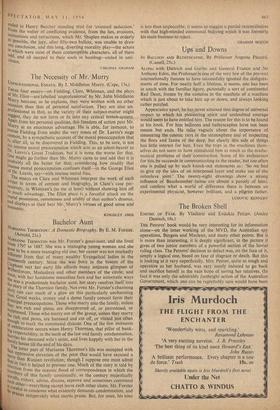Holy Humbugs
KBE LOVE AND HEAVENLY SINNERS. By Robert Shaplen. (Andre Deutsch, 15s.)
'e
night in Brooklyn, New York, in 1870, a devout and
rct lady called Elizabeth Tilton confessed to her husband, Theodore, that she had committed adultery with Henry Ward 4eeeher, who was her pastor as well as being the most famous m
_
ache • and evangelist of the time. From this commendable desire (I Ms. Tilton's part to ease her conscience there snowballed, first e4v°eWnitYuabiut with gathering speed. a scandal of such magnitude that ly the whole nation was involved. 11°he it Shaplen, in Free Love and Heavenly' Sinners,' records every detail of this cause célebre, and it makes fascinating if some- hai be i)tota_olffling reading; baffling because the behaviour of the lists and the moral values of the society in which they ill"ed are so alien to our modern way of thinking as to be barely credible Beecher was a magnificent orator—his Plymouth Church was known as 'Beecher's Theatre'—and he was also, to his ultimate h a Prolific letter-writer. Indeed, in this era before the tele- 1Lone nad blessed indiscretions with euthanasia, everybody wrote iengthilY, endlessly, of their innermost feelings. Most of these letters, in relation to the activities of their authors, are master- es of hypocrisy.
In the initial stageS of the scandal Tilton behaved well. For the sake Of the Church and itsparishioners he vowed silence, but
,4her a atithf11 while the sight of Mr. Beecher preaching virtue to the 1 proved too much for him. He could no longer bear to and el3 the odious secret t himself. He was, of course, disbelieved, ru illour had it that t it was he who was an adulterer, was odious and debased in his habits . . . an immoral libertine.' This iiryas the last straw. Even so the lid of the sewer did not blow off Mfir11111! that wildly eccentric advocate of free love, Victoria Wood- ote letter to the papers urging tat 'apoined judges critics are deeply tainted with the vices theyp condtemn,' and that Sht Proposed 'analysing some of their lives. This analysis ended in Henry Beecher standing trial for 'criminal seduction.' .t'rom the welter of conflicting evidence, from the lies, evasions, dccusations and retractions, which Mr. Shaplen makes as orderly as Possible,. the jury, after fifty-two ballots, was unable to draw doY conclusion, and this long, diverting morality play—the actors 'It which were most of them contemptible characters, all of them °Q, and all steeped to their souls in humbug—ended in anti.
VIRGINIA GRAHAM



































 Previous page
Previous page